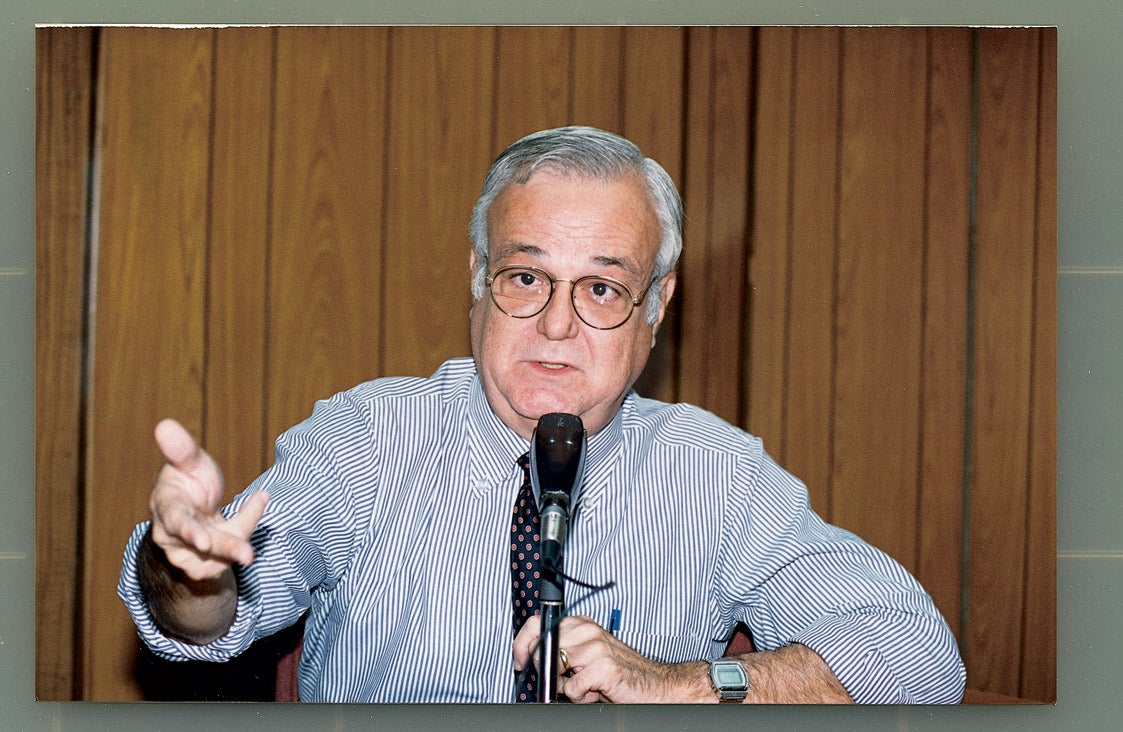Radio talk show host Juan Manuel García-Passalacqua ’62 is urging his listeners–again–to go out and demonstrate. This time it’s to stop the U.S. Navy from testing weapons on the Puerto Rican island of Vieques.
“To the streets!” he exhorts a caller who says that he regrets voting for Governor Sila Calderon, a frequent target of García-Passalacqua’s.
Each weekday from 9 to 10 a.m., 300,000 Puerto Ricans tune in to hear García-Passalacqua chastise their government, the United States, and sometimes the listeners themselves. He calls those with whom he disagrees cabros (goats), illegitimate children, and worse. He swears frequently and unapologetically. It is all an effort to rally his fellow Puerto Ricans to action, he says. His wife, Ivonne Acosta, a history professor, is so offended by his language that she refuses to listen.
“I want to channel the indignation of the listeners in a constructive way,” he said. “I do that by using some rough language to express some of their frustration at the really disastrous situation in Puerto Rico.”
His topics include high unemployment, corrupt political parties, and the poor treatment accorded Puerto Rico by the U.S government. He complains that Puerto Ricans are too accustomed to accepting second-class status from the United States. García-Passalacqua wants Puerto Rico to become a sovereign, autonomous entity that enters into treaties with other countries, such as the United States. Puerto Ricans who advocate statehood aren’t asking for enough, he says. He insists that the U.S. Navy must abandon its training ground on Vieques. He wants residents to vote for honest politicians, rather than simply cast their ballots along party lines. All of Puerto Rico’s political parties are corrupt, he says.
A professor at the Center for Advanced Studies of Puerto Rico and the Caribbean (an independent graduate school in Old San Juan) and the author of 15 books, García-Passalacqua says that his past efforts to reach the intelligentsia of Puerto Rico led nowhere. Now he takes his message to working-class Puerto Ricans.
“The radio show has given me a way of educating the electorate in a manner that I didn’t expect,” said the 65-year-old grandfather of six. “I’m basically an intellectual. I had to learn how to communicate with my people. I had to use some very strong and populist language. That’s why so many people listen to me. I may not have convinced them, but I’ve certainly grabbed them.”
An early supporter of Jimmy Carter, García-Passalacqua became an adviser on Latin American and Caribbean Affairs to the Carter White House. During that time, he advised U.S. officials on their relations with Cuba, including how to handle the Mariel exodus in 1980, when the Cuban government allowed 125,000 Cubans to leave illegally for the United States.
Earlier in his career, García-Passalacqua was often a television commentator on political events. After he retired in 1985 from his job as counsel to an educational foundation, radio and television stations asked him to do political analysis full-time. He started doing his current show, on Noti-Uno, a news/talk radio station, three years ago. A combination of his commentary on the news and calls from listeners, the show is the most popular one in the time slot.
García-Passalacqua says that he sees change in Puerto Ricans’ attitudes. Three years ago, 50 percent of those polled said that they were satisfied with Puerto Rico’s status as a commonwealth, he says. Today, just 25 percent say they are happy with Puerto Rico’s relationship to the United States. García-Passalacqua says that the U.S. Navy’s presence in Vieques and its treatment of protesters fuel the dissatisfaction. But he takes some credit for the shift in attitude.
“I think I’ve been a factor, a key factor, in the change,” he said. “When 75 percent of people say that we have to change, I have achieved my objective.”
–Susan G. Parker
